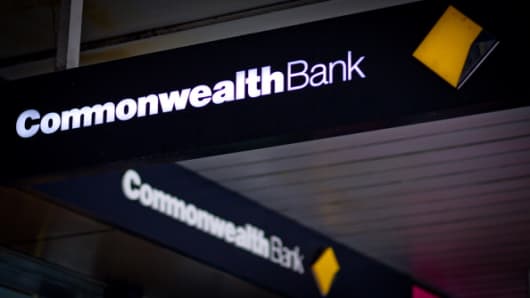Commonwealth Bank of Australia (CBA), Australia's second-biggest lender by assets, missed estimates with a 4 percent rise in first-half earnings, hurt by increased funding costs and higher provisions for bad debts, sending its shares down more than 5 percent.
CBA revealed that turbulence on global credit markets had seen its wholesale funding costs rise by about A$100 million ($90 million) before tax, while it also increased provisions for bad loans by 71 percent to A$333 million.
"This is a disappointing result by most key measures and provides next to no impetus for a change in market sentiment on the stock," Citigroup said in a note to clients.
CBA shares dropped as much as 5.3 percent to a 14-month low of A$46.80, outpacing a 0.5 percent fall in the benchmark S&P/ASX 200 index.
CBA's disappointing earnings weighed down on the sector, with shares in industry leader National Australia Bank and third-ranked Australia and New Zealand Banking Group
CBA reiterated it had no direct exposure to subprime loans, while one of its hedge funds that had some investments in mortgage-backed securities was tracking ahead of the benchmark.
Volatility in global financial markets was expected to continue through this year, putting further upward pressure on domestic interest rates, the bank said on Wednesday.
The Reserve Bank of Australia last week raised interest rates to a decade high of 7 percent.
"Clearly we see the volatility continuing but how that affects our results depends on how our customers react in terms of loan losses," David Craig, CBA's Chief Financial Officer told reporters.
"Funding costs will continue to be high but we have now started to pass those higher funding costs on to our customers," he added.
CBA, also Australia's top mortgage lender and the biggest retail bank, reported July-December cash earnings of A$2.385 billion ($2.149 billion) versus a revised A$2.296 billion a year ago.
A Reuters survey of eight analysts on average forecast CBA to report a cash profit of A$2.47 billion, with estimates ranging from A$2.38-A$2.55 billion.
Cash earnings represent the core profit earned by banks and strip out unrealised profits or losses from interest and foreign exchange hedges. Cash profit also forms the basis for dividend payments.
Higher Funding Costs
CBA's profit rise was in contrast to the woes faced by global banks, many of which have written down billions of dollars due to their exposure to the U.S. subprime mortgage crisis and a subsequent global credit squeeze.
However, higher funding costs and rising interest rates could potentially slow credit demand and push up bad loan charges.
Those concerns, combined with fears of a global economic slowdown, have turned some investors cautious towards Australia's banking sector, despite attractive dividend yields.
"The last six months have been challenging for global banking and wealth management as the subprime assets crisis in the United States has unfolded," CBA Chief Executive Ralph Norris said in a statement.
Still, CBA said it expected to deliver earnings per share growth that will meet or exceed the average of its peers.
"Looking at this result, we believe this will prove a big challenge," the Citigroup note said.
Australian banks have enjoyed robust loan growth on the back of 16 straight years of economic growth, while three-decade low unemployment had kept a lid on bad loans.
But there is growing unease among investors about banks exposure to highly geared companies such as Centro Properties Group
CBA said it had an unsecured exposure of about A$160 million to Centro, which has a Friday deadline to refinance its A$3.9 billion in maturing debt.
Centro on Wednesday denied a newspaper report it had reached an agreement on a debt extension with its creditor banks.
In an unsourced report, The Sydney Morning Herald said banks had given Centro an extra two months to refinance its debt and help avoid a firesale of assets.
Shares in CBA, Australia's most valuable lender by market capitalisation, have fallen by a fifth this year, compared with a 12 percent fall in the benchmark index.




